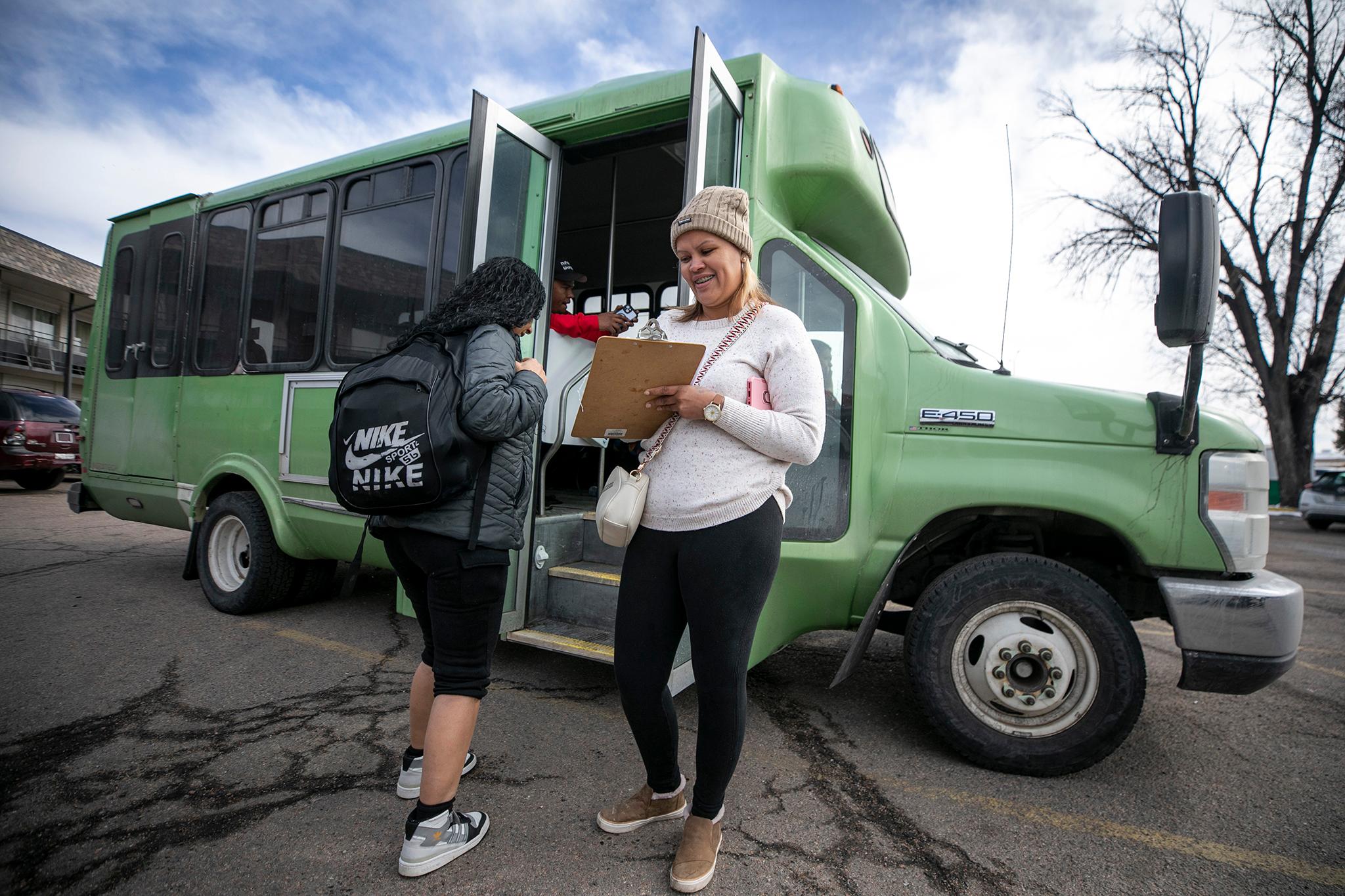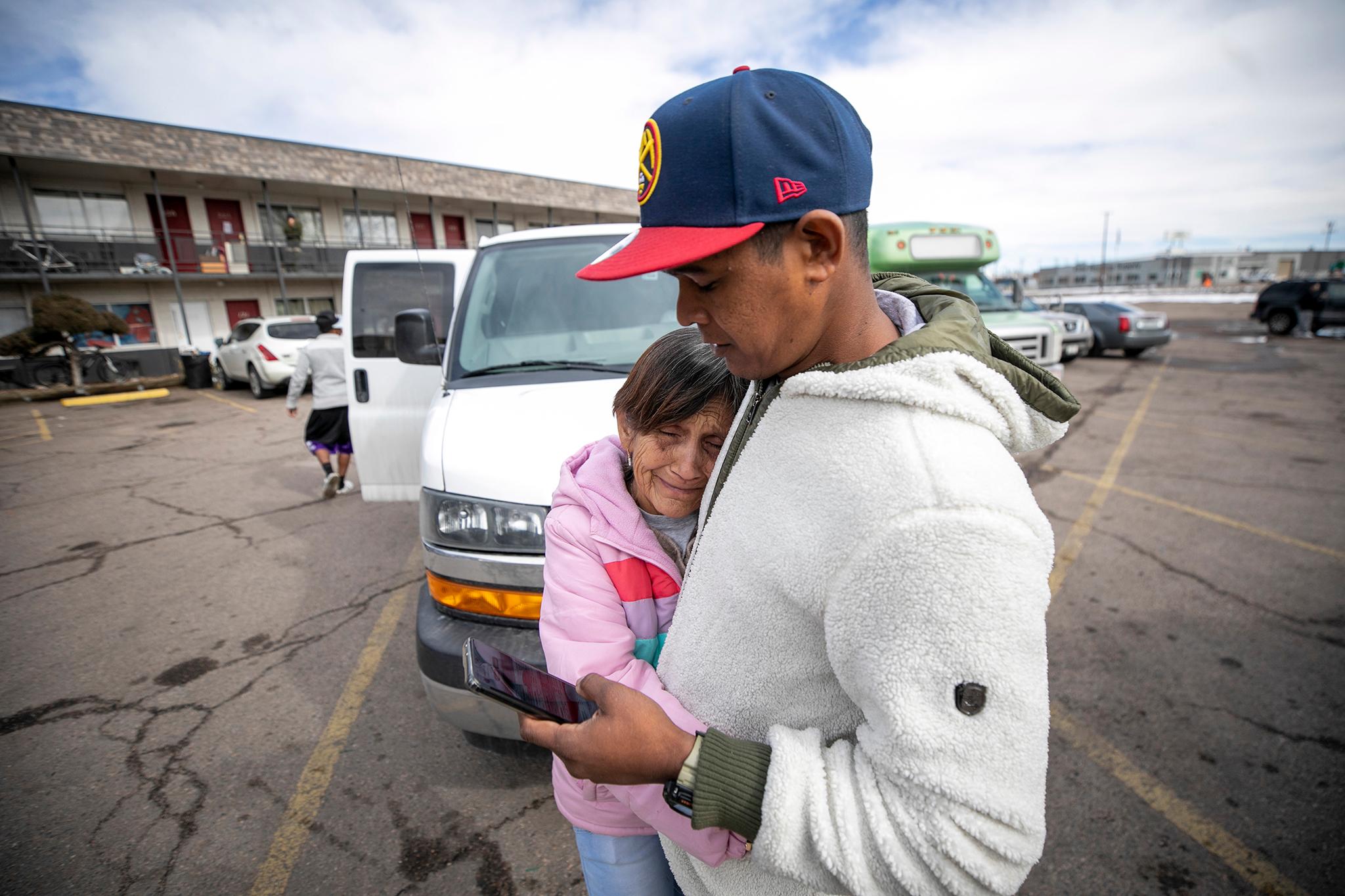Esperanza Ferrer sobbed as she loaded her belongings into a van on Sunday morning, even though she was on her way to fulfilling a dream: Finally, a place of her own in the United States.
She and her son, Yampier, left Venezuela months ago, and arrived in Denver late last year. They'd been living in the Western Motor Inn on Vasquez Boulevard, an old motel that became an unplanned shelter for new immigrants last October. The run-down space was a sanctuary for her and hundreds of others, but its time is now coming to an end as the Western's sale is supposed to be completed soon.
Everyone is supposed to move out so the deal can go through.
"In these four months that I was here, they treated me well, they gave everything to me, they helped me a lot," Ferrer said in Spanish through tears, between long hugs with the friends she was preparing to leave behind. "That's why I'm sad."
The Western was a rogue shelter in Denver, never on an official list of services and barely allowed to exist at all. Things did not always go smoothly there, but the motel and its owner, Yong Cha Prince, did keep hundreds of people from sleeping on city streets as officials struggled to contain the larger humanitarian crisis outside.
Everyone knew the motel would close eventually, but people were still sad when the moment came. Now, its residents are reentering Denver's ecosystem of shelters and nonprofits, hoping to find permanent places to live and figuring out how to afford them, as Prince waits to see how her own uncertain future plays out.

Prince was ready to close the property for good last October when a stranger showed up at her door.
Christina Asuncion had met a handful of Venezuelan immigrants stranded outside on a freezing night, brought them to Yong's place and asked for a room. Prince agreed to let them come inside, then invited more to join them. The place filled up in just a few days. Prince, Asuncion and a group of volunteers organized in a Facebook "moms groups" pitched in to make it a home for them. Some stayed for free, others paid rent, between $100 and $300 a week.
The guests gelled into a family in those early days, growing close in their new home. Prince, who'd lost both her son and husband in recent years, said she'd found new purpose in serving her guests.
"I care about them. They care about me, too," she told us on a January afternoon.

But all the while, Denver health department officials made regular visits to the Western, often posting violation notices to its front door. Rooms where people were sleeping were in rough condition; some had broken plumbing while others were missing carpets and locks on doors. An entire section of the motel was in such bad shape that it had been bolted shut, and garbage generated by Prince's new guests piled up outside.
Still, Prince and the people surrounding her were adamant: These new arrivals had nowhere to go, and this was better than making them sleep in the cold.
Prince owes the city at least $40,000, and is currently awaiting trial over the violations. In January, her attorneys, James Kruetz and Charles Elliott, won an extension in her case, moving her hearing to mid-March. They argued to a Denver County judge that the long-planned sale of the property should be completed by then and should nullify her penalties.
"All issues will become moot," Elliott said in the courtroom.

So Prince and her supporters faced a deadline: move everyone out by the end of February and finish the sale, so her lawyers could return to court and ask the city to drop their cases against her.
As of this story's publication date, Denver's databases contain no official paperwork confirming that the property has sold. No one associated with the potential buyer, an investment firm based in Seattle, answered Denverite's questions about their plans for the site. Her attorneys told the judge that the buyers have been paying Prince $50,000 a month as part of a contract with her, saying that's a good indication the deal will eventually go through.
Things became convoluted as the Western wound down.
Asuncion and the moms group volunteers did manage to move more than a dozen people out by the end of January, but more people showed up and filled their empty rooms.
"They can't expect us to get all these people out. Like, I'm only getting the people that were registered to be here. Now these new people - I don't know where they came from," Asuncion said at the end of January.
Asuncion worried especially for Esperanza Ferrer and her son, Yampier, who has a developmental disability. Some of the Facebook moms tried to secure housing for them, but their efforts fell through over and over again.
"I just don't want them separated, because they're all they have," Asuncion said.

Both she and Prince knew they couldn't keep this up forever. But though they were tired, and though Prince said she was spending too much of her retirement savings on the project, they still felt strongly they were doing the right thing.
"My friends say I'm crazy. I say, 'You know what, you can't take money with you,'" Prince said. "So I'm going to try the best I can until I burn out."
Though Prince often described her guests as a new family, not everyone got along. In December, she kicked a family out of one room, sending them to a city-run emergency shelter, after some of their members got into a fight in the parking lot. Prince said she called the police to break it up. In February, she fell outside as she broke up another fight, picking up bruises and a black eye in the process.

Meanwhile, national media caught wind of Prince's story, and reporters from around the world stopped by the Western to interview her about her little sanctuary. As Prince spoke to press, she gave shifting accounts of what she'd do once the Western closed. One week, she said she'd buy a new motel, or lease another, to move herself and her guests into a similar living situation; one deal fell through after Denverite and a moms group member called to confirm it was happening. Another week, she said she planned to rent a farm where she and some of her beloved new family might live and work.
To the advocates working around her, these changing stories were cause for alarm. Prince and her lawyers also gave them conflicting information about when guests needed to move out, and they worried they might fail to find housing for residents in the confusion.
Discussions on Facebook showed their relationship with Prince was souring. They argued about her on their page, worrying about a perceived lack of transparency about where donated money was going. Prince, too, complained about the group's members. Both sides accused the other of stealing cash meant to help people living there.
All of this made for an emotional day as buses pulled up to the Western.
The Facebook moms group buzzed with activity last week, as they tried to organize some kind of transport for people who they felt needed to leave the motel. Then, on Sunday morning, they got word that ViVe Wellness and city officials would come through with help.
Most people would go to an emergency shelter set in a westside gym, which reopened after the city swept a large encampment of new immigrants in early January. ViVe was running that operation, and executive director Yoli Casas said they'd been successful enough in helping people move out of the shelter that they had room for the Western's exiting guests.

Some, like Ferrier, were upset to leave the community that had grown in the aging motel. Prince, too, said she was feeling low.
"I'm kind of sad. I can't do it no more. It's not mine no more, what can I do?" she said. "I'm lucky I did it five months."
But Prince and others who helped at the motel also expressed relief that things were finally winding down. Members of the moms group told us as much; so did Christina Asuncion.
"I have to get back to work, so there's a part of the that's really sad to have it come to an end. But there's another part of me that's glad," she said. "A lot of the families, they're getting into their own places. It's exciting to see them move on."

Asuncion acknowledged that Prince's relationships with the advocates - and with her - had frayed over recent months. Caring for all these people has been stressful, she said and echoed Prince's words when she told us things could have easily fallen apart back in November.
"We couldn't have done it without the volunteers. We couldn't have done it without the community members," she said. "All of the people who showed up, they all have to be thanked and recognized."
Now that their roles in this broader crisis are coming to an end, Asuncion said she hopes Prince finally takes a moment to breathe.
"You've got to go enjoy your life. Go enjoy your grandkids," she said. "That's what I really hope she does."

As the Western Motor Inn project fades, its former guests are beginning new stages of their own journeys. People are still living there; some are bound for the Denver Archdiocese's Mullen Home, others are still figuring out what's next.
For everyone, the motel offered a place to rest, after long, dangerous treks to the U.S. Despite the fights over its aging structures, and who really was in charge, most everyone we spoke to said they were grateful for the safety this place offered, and help moving on.
Yampier flopped his new bed as he and his mom moved into their new home on Sunday afternoon, smiling wide. By then, Ferrer's mood had shifted from sorrow to delight.
"It's so beautiful," she said. "So beautiful."














